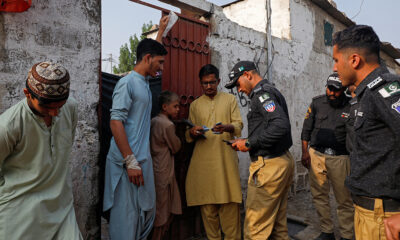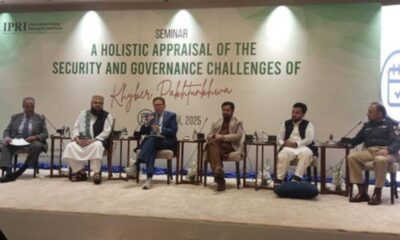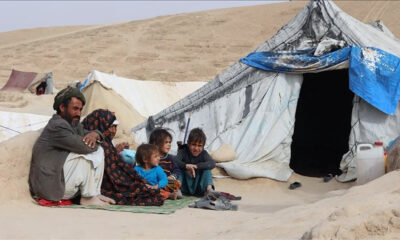Regional
Pakistan launches strikes inside Iran against militant targets
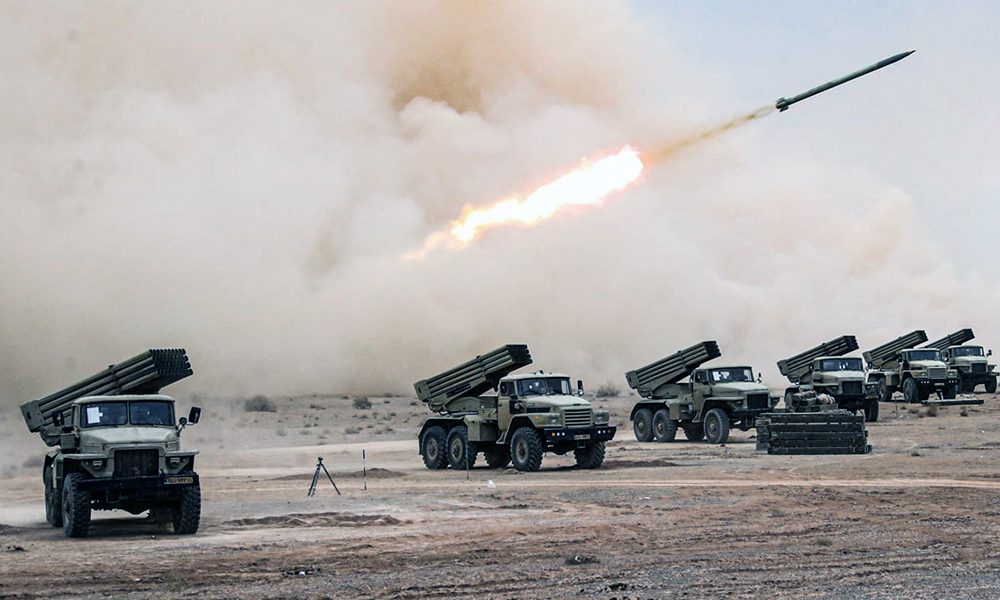
Pakistan conducted strikes inside Iran on Thursday, targeting separatist militants, the Pakistani foreign ministry said, two days after Tehran said it attacked Israel-linked militant bases inside Pakistani territory, Reuters reported.
Iranian media said several missiles hit a village in the Sistan-Baluchistan province that borders Pakistan, killing three women and four children, all non-Iranians.
“A number of terrorists were killed during the intelligence-based operation,” the Pakistani ministry said in a statement, describing it as a “series of highly coordinated and specifically targeted precision military strikes against terrorist hideouts”.
It added, “Pakistan fully respects the sovereignty and territorial integrity of the Islamic Republic of Iran.
“The sole objective of today’s act was in pursuit of Pakistan’s own security and national interest, which is paramount and cannot be compromised.”
A Pakistani intelligence source told Reuters the strikes were carried out by military aircraft, read the report.
“Our forces have conducted strikes to target Baloch militants inside Iran,” the intelligence official in Islamabad, the Pakistani capital, said.
“The targeted militants belong to BLF,” he added, referring to the Balochistan Liberation Front, which seeks independence for Pakistan’s Balochistan province.
Iran said on Tuesday it had targeted Israel-linked militant bases inside Pakistan. Pakistan said civilians had been hit and two children killed, warning of consequences for which Tehran would be responsible.
Islamabad recalled its ambassador from Iran on Wednesday, Reuters reported.
Pakistan and Iran have in the past had rocky relations, but the strikes are the highest-profile cross-border intrusion in recent years.
Pakistan recalls envoy from Iran after ‘unprovoked’ missile strikes
Pakistan recalled its ambassador from neighbouring Iran on Wednesday to protest at a “blatant breach” of its sovereignty after Tehran said it launched missile attacks on militant bases in southwestern Pakistan.
Iran’s foreign minister said it hit militants in “missile and drone” strikes. State media said Iranian missiles struck two bases of the Sunni Muslim group Jaish al-Adl, designated a “foreign terrorist organisation” by the U.S. State Department.
Nuclear-armed Pakistan said a violation of its airspace resulted in the deaths of two children but has not confirmed the nature of the violation, or the location of the strikes.
Only militants were hit, Iranian Foreign Minister Hossein Amirabdollahian said in Davos, Switzerland, where he was attending the World Economic Forum, alleging those attacked were linked to Israel, read the report.
Pakistan and Iran have in the past had rocky relations, but the strikes are the highest-profile cross-border intrusion in recent years.
The strikes were launched a day after similar attacks carried out by Tehran inside other neighbours, Iraq and Syria. Baghdad recalled its ambassador from Tehran after Iran’s state-backed media said it had hit an Israeli espionage centre.
Provincial officials in Pakistan said two children were killed and several others injured in strikes near the Iran border.
The violation was unprovoked and unacceptable, said Pakistani foreign ministry spokeswoman, Mumtaz Zahra Baloch. Pakistan reserved “the right to respond to this illegal act”, a message it had conveyed to the Iranian government, she said.
Pakistan would not allow Iran’s ambassador, currently visiting his home country, to return, Baloch said.
A joint border trade committee meeting had been canceled, and a Pakistani trade delegation had been recalled from Chabahar in Iran, said government official Aurangzeb Badini.
“Further escalation is possible, though Islamabad has strong incentives to be cautious,” said Michael Kugelman, director of the Wilson Center’s South Asia Institute, adding that Beijing might also step in to help mediate.
“China has close ties to both Iran and Pakistan, and it has a strong interest in the crisis not spiraling out of control …it will likely quietly press the two sides to step back from the brink” he said.
Jaish al-Adl has in the past mounted attacks on Iranian security forces in the border area with Pakistan.
Officials in Pakistan’s southwestern province of Balochistan, which borders Iran, said that four missiles had hit the Panjgur district close to the border.
“Four missiles were fired in the village of Koh-i-Sabaz which is around 50 km (31 miles) inside Pakistan soil,” a senior official of the Panjgur administration told Reuters.
“A mosque and three houses were damaged in the attack,” another official said, adding that two young girls were killed and three other people injured.
Jaish al-Adl, which says it seeks greater rights and better living conditions for ethnic minority Baluchis, has claimed responsibility for several attacks in recent years on Iranian security forces in Iran’s southeastern province of Sistan-Baluchestan.
In its previous iteration as Jundallah, the group had pledged allegiance to Iraq- and Syria-based jihadist group the Islamic State.
Iran’s Amirabdollahian had a phone call with his Pakistani counterpart Jalil Abbas Jilani, according to an Iranian foreign ministry statement, and stressed Tehran’s respect for Pakistan’s sovereignty, Reuters reported.
“Iran’s security has been repeatedly targeted by Jaish al- Adl terrorist group from Pakistani soil and we are hopeful that stronger security cooperation between the two countries continue,” Amirabdollahian said.
Regional
US discusses tariffs, critical minerals, immigration with Pakistan
In the call with Dar, Rubio emphasized the importance of Pakistan’s cooperation with the U.S. on law enforcement and addressing illegal immigration, the State Department said.
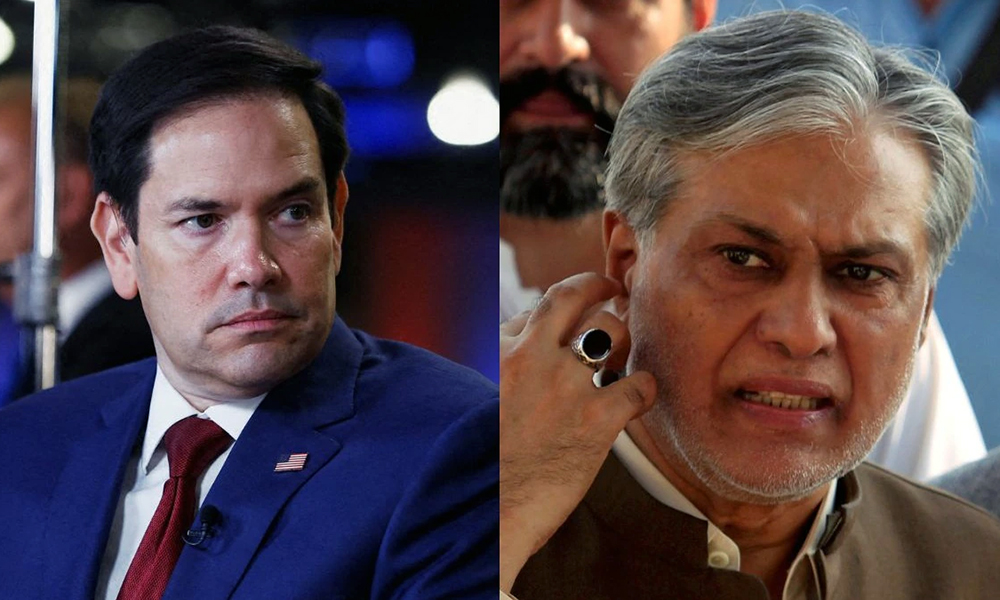
U.S. Secretary of State Marco Rubio spoke to Pakistani Foreign Minister Ishaq Dar on Monday about tariffs, trade relations, immigration and prospects for engagement on critical minerals, the State Department, and Pakistan’s foreign ministry, said in separate statements.
President Donald Trump said last week that he would impose a 10% baseline tariff on all imports to the U.S. and higher duties on dozens of other countries, including some of Washington’s biggest trading partners, rattling global markets and bewildering U.S. allies. The Trump administration imposed a 29% tariff on Pakistan, Reuters reported.
“They (Rubio and Dar) discussed U.S. reciprocal tariffs on Pakistan and how to make progress toward a fair and balanced trade relationship,” the State Department said.
The U.S. goods trade deficit with Pakistan was $3 billion in 2024, a 5.2 % increase over 2023, according to the Office of the U.S. Trade Representative.
“The Secretary raised prospects for engagement on critical minerals and expressed interest in expanding commercial opportunities for U.S. companies.”
Pakistan’s foreign ministry said Rubio “reciprocated the desire to collaborate with Pakistan in trade and investment in various sectors, especially critical minerals.”
The Trump administration has also used prospects of engagement over critical minerals with other countries.
For example, it is attempting to strike an agreement over critical minerals with Ukraine as part of talks related to the Russia-Ukraine war. Washington has also said it is open to exploring critical minerals partnerships with Congo and help end a conflict raging in the African country’s east.
In the call with Dar, Rubio emphasized the importance of Pakistan’s cooperation with the U.S. on law enforcement and addressing illegal immigration, the State Department said.
Last month, Pakistan highlighted its cooperation with Washington on countering extremism after the arrest of Mohammad Sharifullah, whom the U.S. blames for a 2021 attack on its troops at Kabul airport, in a military operation along the border with Afghanistan, read the report.
The Pakistan foreign ministry said Rubio and Dar discussed the situation in Afghanistan.
Regional
Iran-backed militias in Iraq ready to disarm to avert Trump wrath
The move to defuse tensions follows repeated warnings issued privately by U.S. officials to the Iraqi government since Trump took power in January
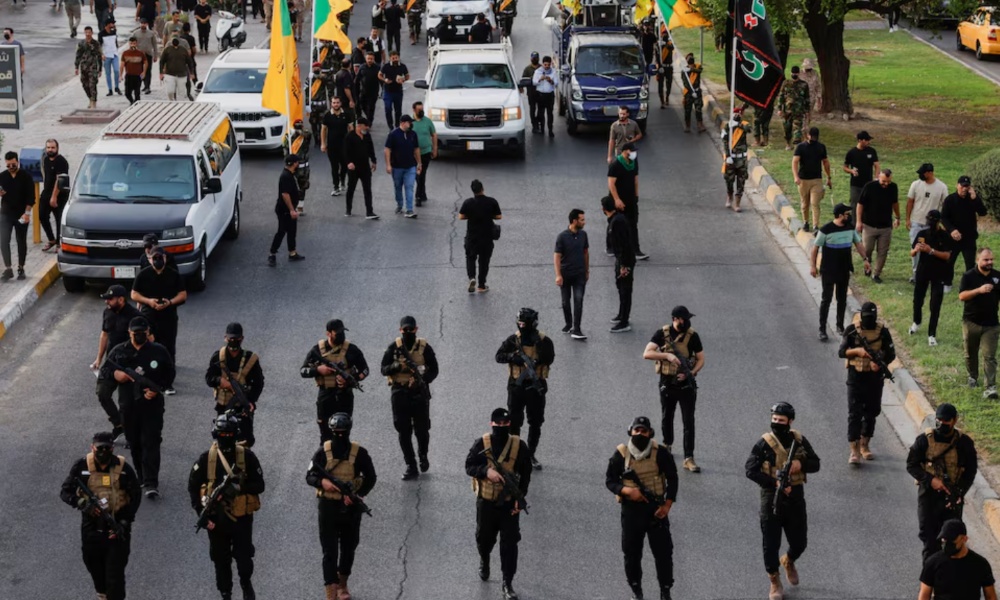
Several powerful Iranian-backed militia groups in Iraq are prepared to disarm for the first time to avert the threat of an escalating conflict with the U.S. Trump administration, 10 senior commanders and Iraqi officials told Reuters.
The move to defuse tensions follows repeated warnings issued privately by U.S. officials to the Iraqi government since Trump took power in January, according to the sources who include six local commanders of four major militias.
The officials told Baghdad that unless it acted to disband the militias operating on its soil, America could target the groups with airstrikes, the people added.
Izzat al-Shahbndar, a senior Shi’ite Muslim politician close to Iraq’s governing alliance, told Reuters that discussions between Prime Minister Mohammed Shia al-Sudani and several militia leaders were “very advanced”, and the groups were inclined to comply with U.S. calls for disarmament.
“The factions are not acting stubbornly or insisting on continuing in their current form,” he said, adding that the groups were “fully aware” they could be targeted by the U.S.
The six militia commanders interviewed in Baghdad and a southern province, who requested anonymity to discuss the sensitive situation, are from the Kataib Hezbollah, Nujabaa, Kataib Sayyed al-Shuhada and Ansarullah al-Awfiyaa groups.
“Trump is ready to take the war with us to worse levels, we know that, and we want to avoid such a bad scenario,” said a commander of Kataib Hezbollah, the most powerful Shi’ite militia, who spoke from behind a black face mask and sunglasses.
The commanders said their main ally and patron, Iran’s elite Revolutionary Guards (IRGC) military force, had given them its blessing to take whatever decisions they deemed necessary to avoid being drawn into a potentially ruinous conflict with the United States and Israel.
The militias are part of the Islamic Resistance in Iraq, an umbrella group of about 10 hardline Shi’ite armed factions that collectively command about 50,000 fighters and arsenals that include long-range missiles and anti-aircraft weapons, according to two security officials who monitor militias’ activities.
The Resistance group, a key pillar of Iran’s network of regional proxy forces, have claimed responsibility for dozens of missile and drone attacks on Israel and U.S. forces in Iraq and Syria since the Gaza war erupted about 18 months ago.
Regional
Iran wants indirect talks with US, warns regional countries over strikes against it
Trump has said he would prefer a deal over Iran’s nuclear programme to a military confrontation and he said on March 7 he had written to Khamenei to suggest talks.
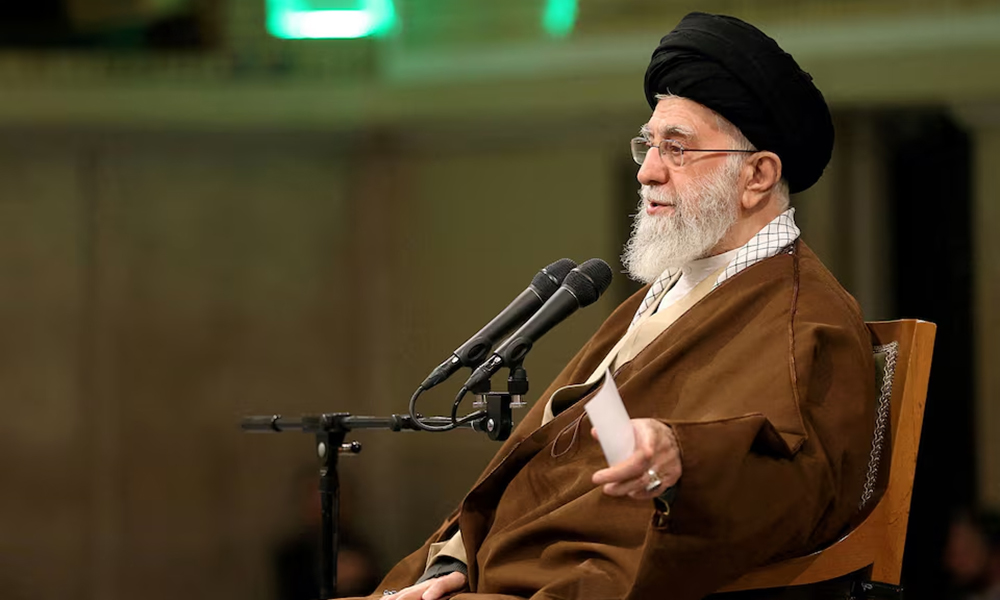
Iran is pushing back against U.S. demands that it directly negotiate over its nuclear programme or be bombed, warning neighbours that host U.S. bases that they could be in the firing line if involved, a senior Iranian official said.
Although Iran has rejected U.S. President Donald Trump’s demand for direct talks, it wants to continue indirect negotiations through Oman, a longtime channel for messages between the rival states, said the official, who spoke to Reuters on condition of anonymity.
“Indirect talks offer a chance to evaluate Washington’s seriousness about a political solution with Iran,” said the official.
Although that path could be “rocky”, such talks could begin soon if U.S. messaging supported it, the official said.
Iran has issued notices to Iraq, Kuwait, the United Arab Emirates, Qatar, Turkey and Bahrain that any support for a U.S. attack on Iran, including the use of their air space or territory by U.S. military during an attack, would be considered an act of hostility, the official said.
Such an act “will have severe consequences for them”, the official said, adding that Supreme Leader Ayatollah Ali Khamenei had placed Iran’s armed forces on high alert.
Warnings by Trump of military action against Iran have jangled already tense nerves across the region after open warfare in Gaza and Lebanon, military strikes on Yemen, a change of leadership in Syria and Israeli-Iranian exchanges of fire.
Worries of a wider regional conflagration have unsettled states around the Gulf, a body of water bordered on one side by Iran and on the other by U.S.-allied Arab monarchies that carries a significant proportion of global oil supplies.
Spokespeople for the governments of Iraq, Kuwait, the UAE, Qatar and Bahrain did not immediately respond to requests for comment. Turkey’s Foreign Ministry said it was not aware of a warning but that such messages could be conveyed by other channels.
On Wednesday, Iranian state media reported that Kuwait had reassured Iran that it would not accept any aggressive action being directed at other countries from its soil.
Iran’s ally Russia said on Thursday that U.S. threats of military strikes against the Islamic Republic were unacceptable and on Friday called for restraint.
Iran is trying to gain more support from Russia, but is sceptical about Moscow’s commitment to its ally, said a second Iranian official. This “depends on the dynamics” of the relationship between Trump and Russian President Vladimir Putin, the official said.
Trump has said he would prefer a deal over Iran’s nuclear programme to a military confrontation and he said on March 7 he had written to Khamenei to suggest talks.
The first Iranian official said a first round of indirect talks could involve Omani mediators shuttling between the Iranian and U.S. delegations. Khamenei has authorised Foreign Minister Abbas Araqchi or his deputy, Majid Takht-e Ravanchi, to attend any talks in Muscat.
Oman’s government spokesperson did not immediately respond to a request for comment.
However, the official believed there was a window of around two months to agree a deal, citing worries that Iran’s long-time foe Israel might launch its own attack if talks took longer, and that it could trigger a so-called “snap back” of all international sanctions on Iran to prevent the country from acquiring a nuclear weapon.
Iran has long denied wanting to develop a nuclear weapon. However, it is “dramatically” accelerating enrichment of uranium to up to 60% purity, close to the roughly 90% weapons-grade level, the U.N. nuclear watchdog has warned.
Western states say there is no need to enrich uranium to such a high level under any civilian program and that no other country has done so without producing nuclear bombs.
While Iran has said it will consider talks with the U.S. if the aim was to address concerns over its programme, it has rejected holding any direct negotiations when the U.S. is making threats and has said its missile programme would be off limits.
A senior Iranian military commander, the Islamic Revolutionary Guards Corps’ Amirali Hajizadeh, had implied on Monday that U.S. bases in the region could be targeted in any conflict.
In 2020, Iran targeted U.S. bases in Iraq after the assassination of Qassem Soleimani, the head of the IRGC’s Quds Force, in a U.S. missile strike in Baghdad.
-

 Business5 days ago
Business5 days agoTrump imposes 10% tariff on imports from Afghanistan
-

 Latest News4 days ago
Latest News4 days agoKhyber Pakhtunkhwa chief minister proposes permanent residence for Afghan refugees
-

 Business4 days ago
Business4 days agoTrump unveils first $5 million ‘gold card’ visa
-

 Latest News4 days ago
Latest News4 days agoSixty Afghans rounded up in Rawalpindi and Islamabad
-

 Regional4 days ago
Regional4 days agoIsrael steps up Syria strikes, says Turkey aims for ‘protectorate’
-
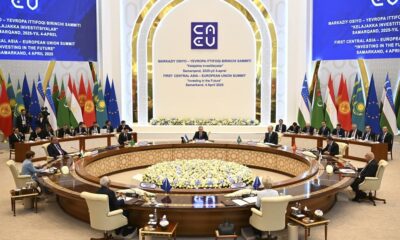
 Latest News4 days ago
Latest News4 days agoEU-Central Asia summit calls for inclusive government in Afghanistan
-
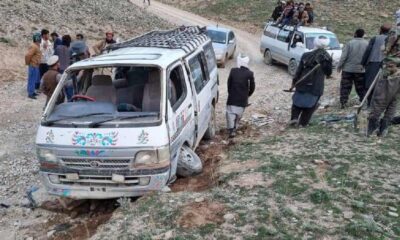
 Latest News4 days ago
Latest News4 days agoThirty, killed, 155 injured in traffic accidents in Afghanistan during Eid
-

 Sport4 days ago
Sport4 days agoIyer blitz powers Kolkata to big IPL win over Hyderabad


